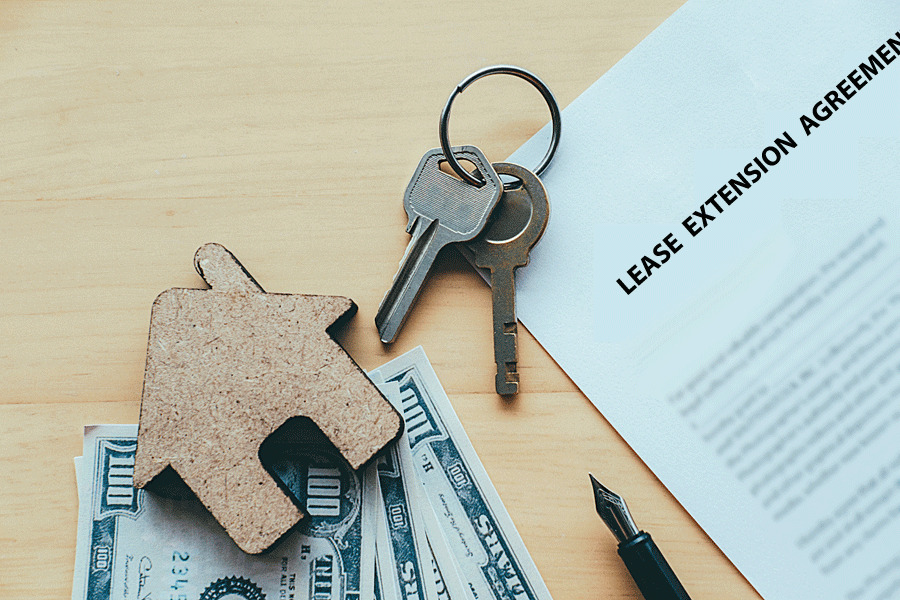An agreement between the landlord and tenant to extend the original lease is known as a lease renewal (extension) agreement.
Under this type of agreement, both parties agree on contract changes that may be more favourable for one party. If the original lease is to be renewed, it should be communicated 30 to 90 days prior to its termination date. Sometimes this renewal is automatic. In other circumstances, it’s wise to include the conditions for renewing a lease in the original contract. In both commercial and residential leasing, an extension of the agreement is used. It should include all of the terms and conditions of the new contract, including the rent, time, security deposit, payment terms, etc., regardless of whether they have been modified.
Extending a lease agreement can be beneficial to the landlord because it ensures rental units are always occupied and reduces the inconvenience of screening new tenants, especially if the relationship with the current tenant is sustainable. This document can also be used for any additional terms of the original lease contract. This article will explore a lease renewal (extension) contract, how it works, and its advantages and disadvantages.
Free Editable Templates
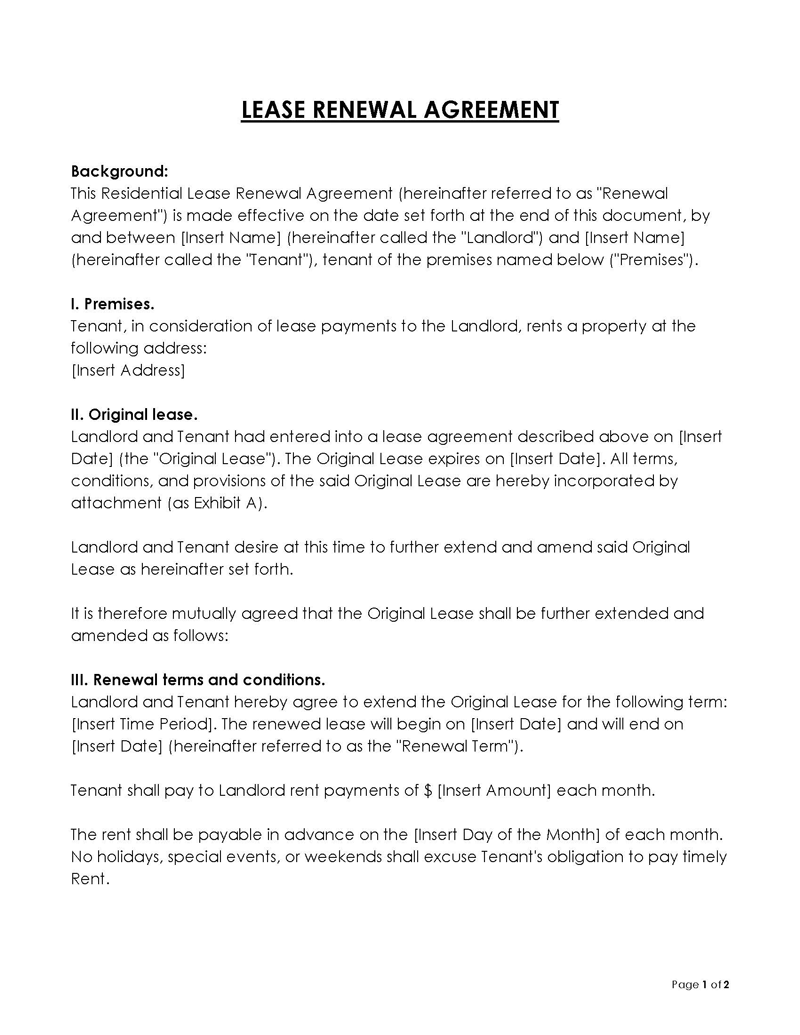
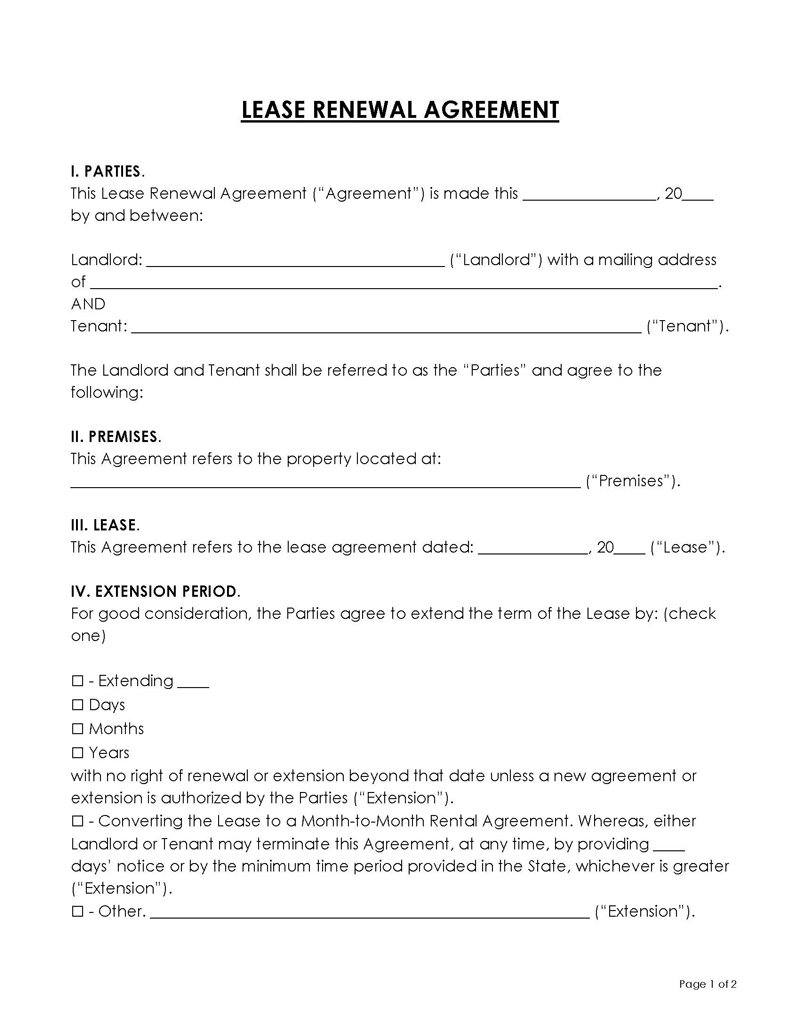
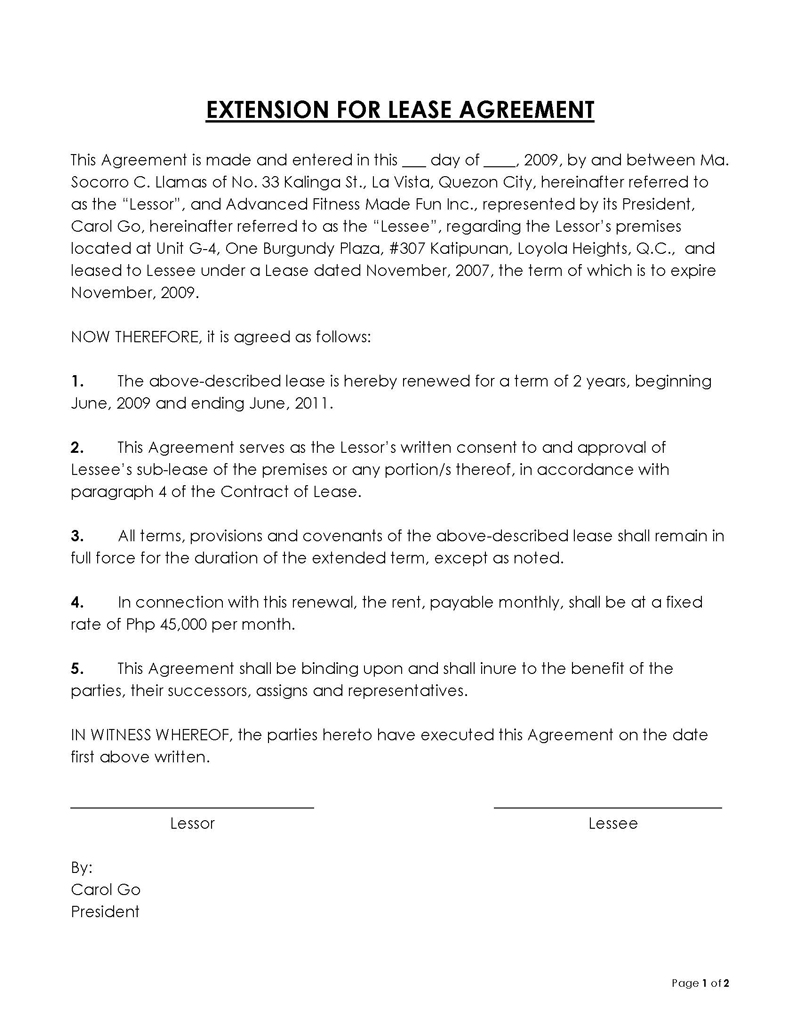
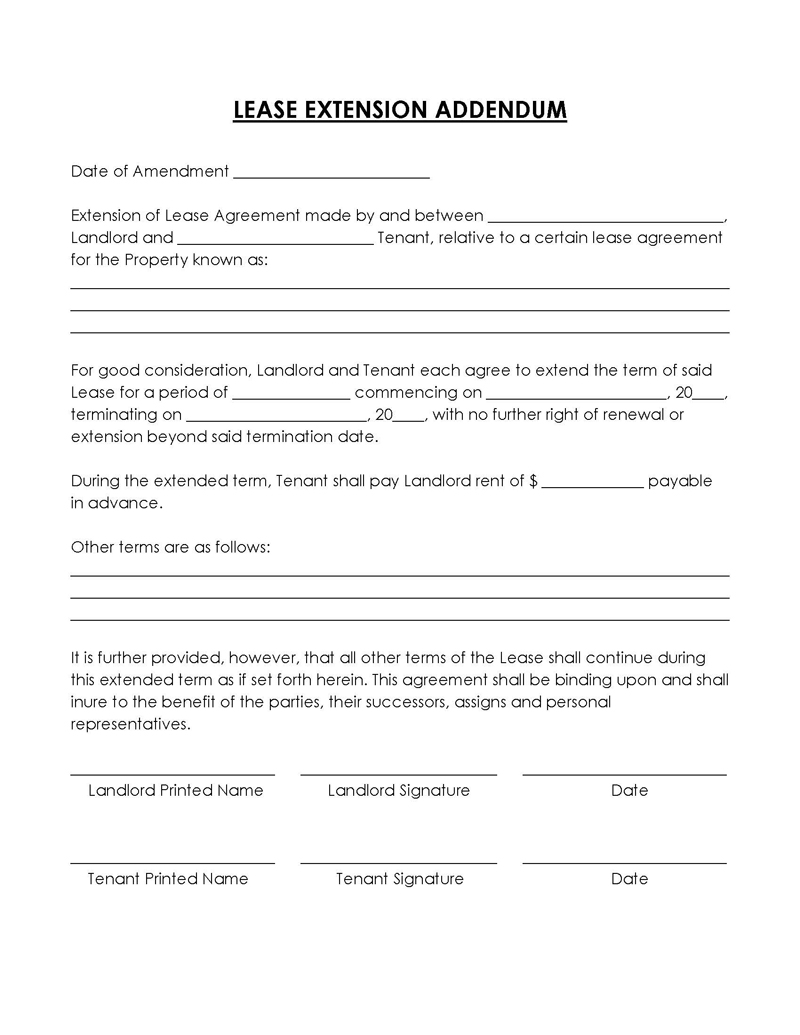
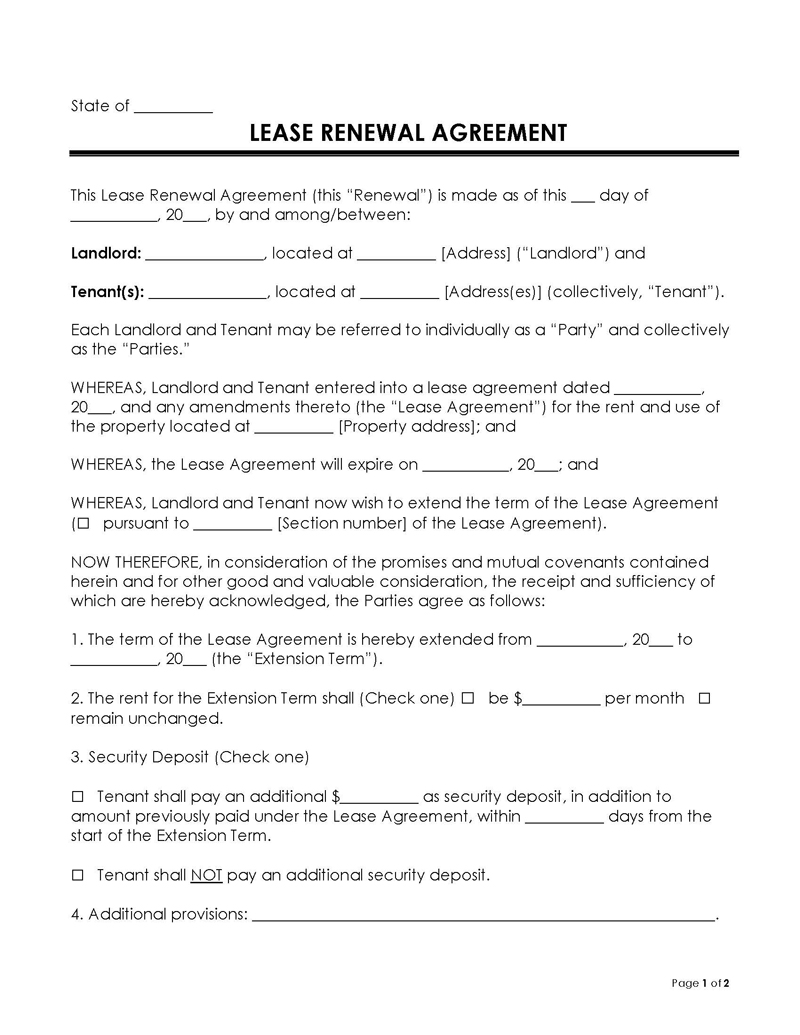
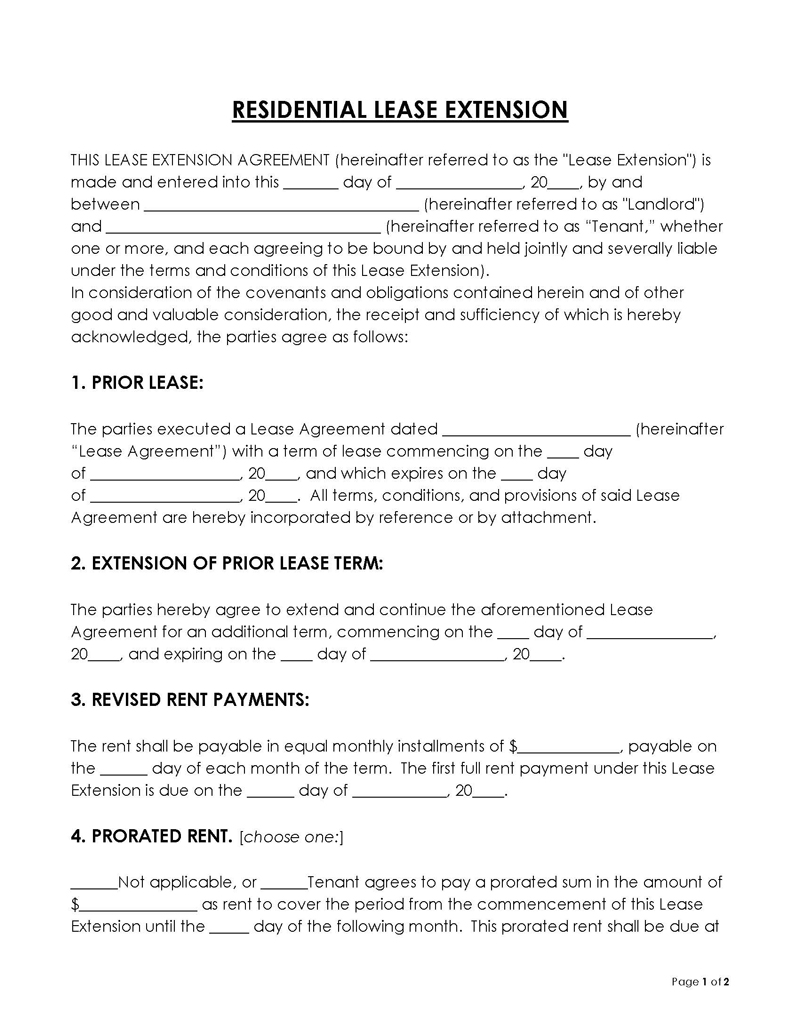
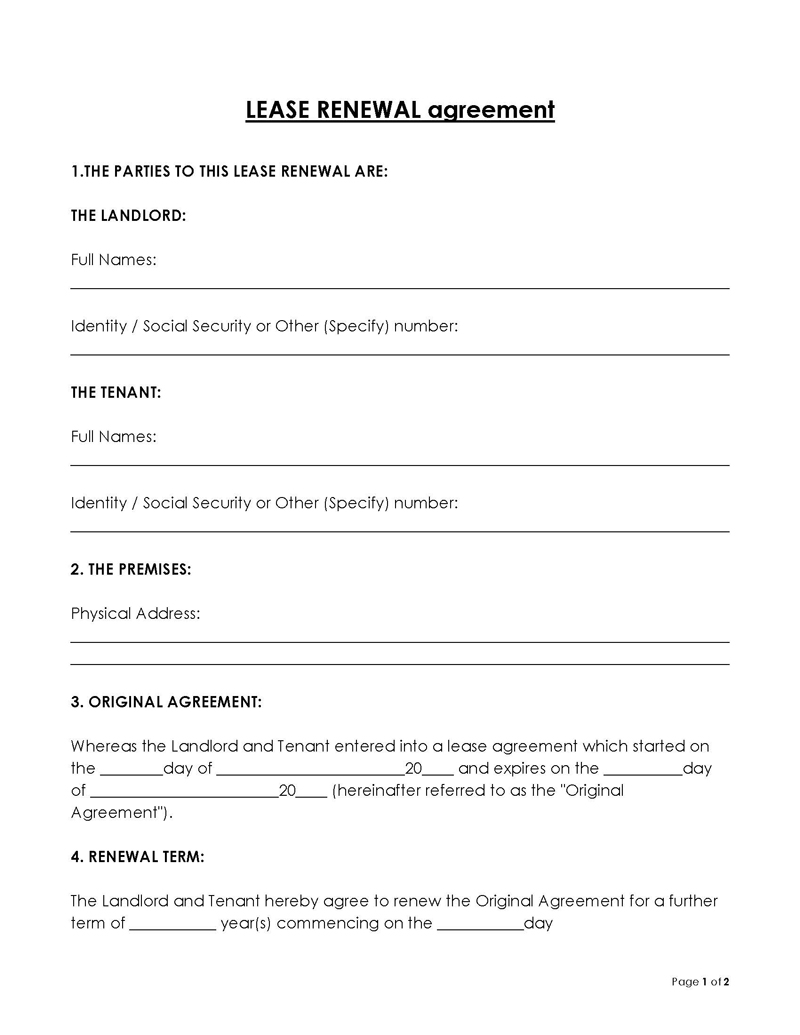
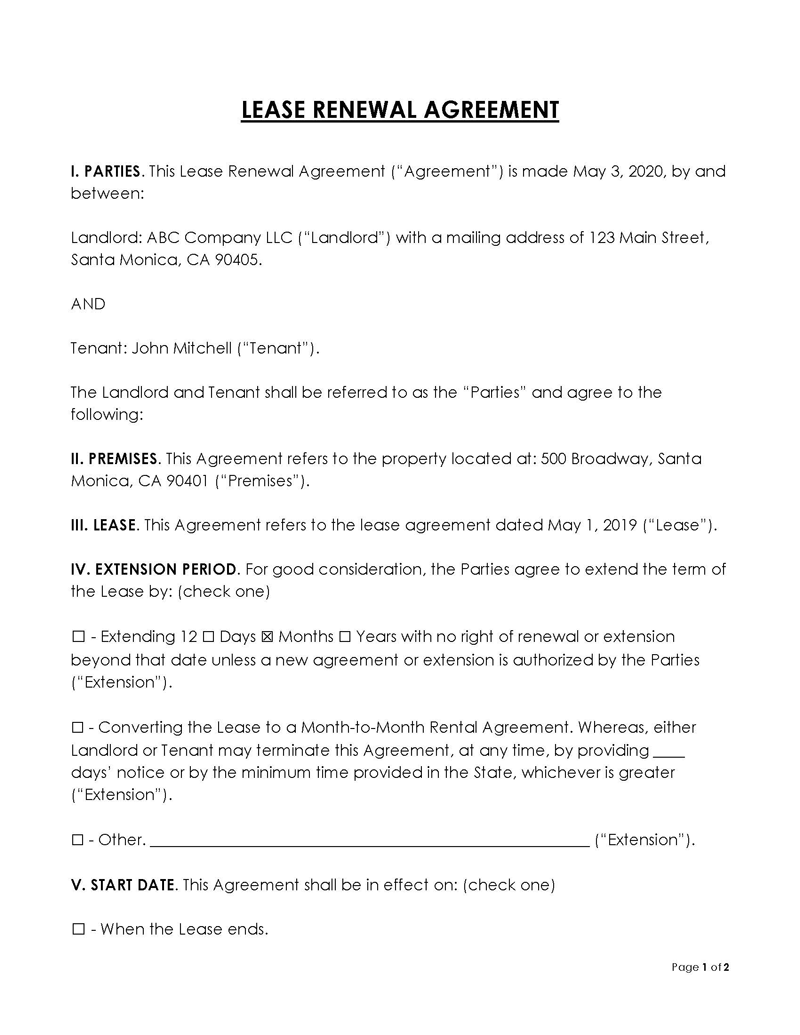
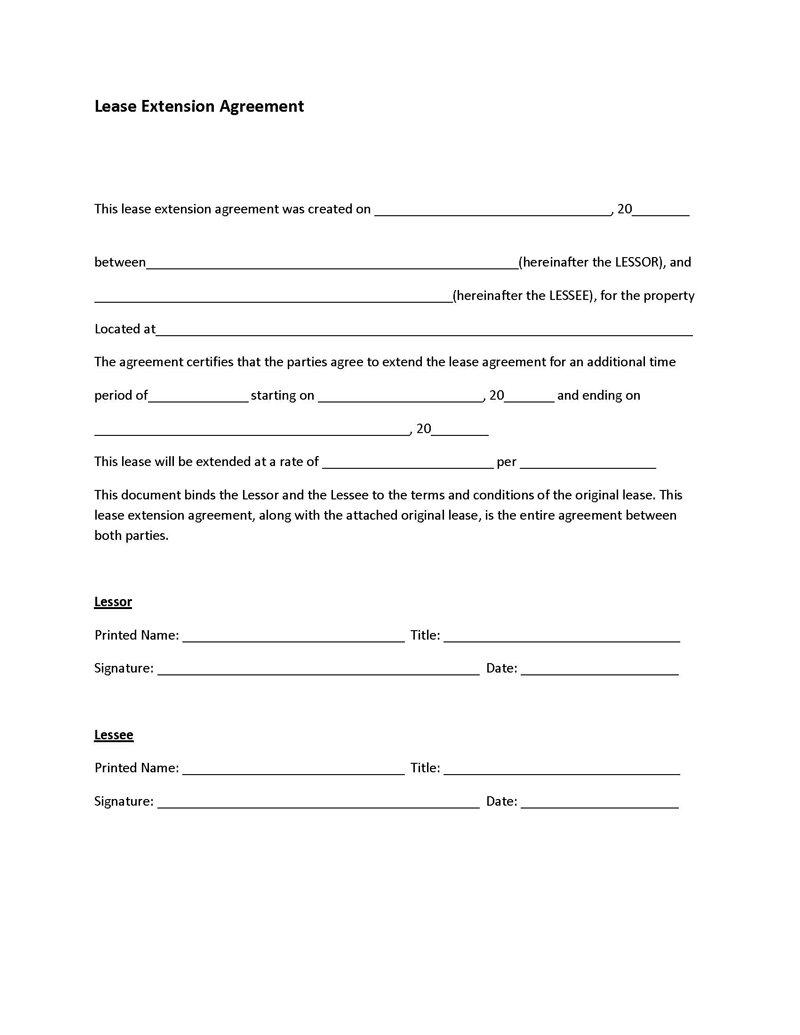
The Process: Step-by-Step
The contract for renewing or extending a lease ought to be written and signed by both parties to be effective. This new contract will be effective after the previous one expires. The agreement can be renewed, which implies the creation of a new agreement, or extended, which essentially implies prolonging the expiration date of the existing agreement.
A lease renewal (extension) contract can be executed in the following steps:
Step 1: Prepare the agreement
The process of renewal or extension should begin with deciding whether one wants to extend the lease to the current lessee. If so, the first step is to determine any requirements that must be met by consulting the relevant state and local laws. Next, prepare the renewal contract, which contains all the required components of an enforceable lease agreement. Include any modifications deemed necessary, such as adjustments to the rental rate, new building codes, and payment options.
Step 2: Send the contract to the tenant
Once completed, send the lease renewal contract to the tenant. This is within the allocated notice period before the original lease expires. To guarantee receipt acknowledgment, it can be sent via certified mail.
Step 3: Await the tenant’s response
The tenant will then have the option of accepting or rejecting the contract. Depending on the tenant’s response, the landlord may need to take action by executing a new lease, organising a negotiation session, or ending the current lease. Some tenants may make a counteroffer in response, allowing the landlord to decide whether or not the proposed terms are acceptable. In such a situation, the next step will often be a negotiation.
Step 4: Negotiate the terms
If both parties are interested in renewing or extending the contract, negotiations can begin. Monthly rent, security deposits, lease terms, new insurance requirements, policies, and regulations are some of the lease terms that are frequently negotiated. One approach to determining the profitability of the tenant’s offer is to compare the cost of turnover to the cost of the suggested changes. For instance, the cost of renovating the house for a new tenant would assume the obligation to cover the water utility bill. Additionally, you can research current fair market rents to see whether changes are needed or not.
note
If both the landlord and the tenant decide to renew the lease with the exact terms of the previous lease, the renewed contract should state that the original agreement is, in fact, “in full force and effect.” However, it is vital to note that lease extensions can be affected by certain local and state housing law stipulations. Therefore, it is imperative to learn about these laws or hire an attorney.
Step 5: Gather important documents
Next, gather all the relevant documentation in preparation for writing the final agreement. Some of the important documents that ought to be gathered include a copy of the original lease, the new rent amount, and modified terms and conditions.
Step 6: Create and sign the new lease contract
Finally, you can create a new lease renewal extension contract. It should include all the changes agreed upon, such as rent, security deposit, and other terms. Then both parties should sign it for it to be effective. Finally, finalize the process by keeping a copy yourself, providing copies of documents to the tenant, and updating your records.
What to Include?
To prevent misunderstandings, the contract for renewing or extending the lease must include all necessary information in full. These include the rent amount, duration of the lease contract, and any additional details.
Fundamental components to include in the agreement include:
Lease renewal date
The start date of the renewed lease, which should be on or before the exact day when the existing lease expires, should be included. The extension term officially begins on this date.
Landlord’s information
The landlord’s name, contact information, address, and phone number should be included. This information is needed for correspondence. If a property manager is managing the property, then their details should be provided too.
Tenant’s information
This includes everything from the tenant’s name to contact details such as email and place of work. This is important for communication between both parties so that it can be easily maintained and fairly addressed as needed.
Property details
The square footage, any known flaws, and any fixtures, furniture, and other items that the tenant may use during the term of the lease but is not the owner of should all be included in a thorough description of the property. The rental unit’s mailing address should also be included.
Net rent amount and security deposit
The amount of rent to be paid each month along with security deposit (if required) should be specified in terms of a specific currency and, if applicable, include tax. State if there are any changes with regard to payment methods, frequency, and the address where payments should be sent.
Cite the original lease agreement
The original lease between the landlord and tenant should be cited in the lease extension agreement. The commencement and expiration dates of the initial lease may be mentioned in this section.
Extension period
This is the period the current tenant can occupy the property under the new agreement. This should be stated in terms of months, weeks, and days. Include the details of how the agreement can be terminated. This should indicate if both parties agree to the terms or if they can be terminated with a notice period by either party.
Proposed start and end date
This should include the date the lease is supposed to start and when it’s supposed to end. The start date should be after the existing lease agreement expires, and the end date should be at the expiration of the lease extension.
Additional renewal terms
The agreement should also include details of any changes made to the original lease that the landlord and tenant have agreed on. This includes any changes that have been made to address issues raised by either party.
Signatures
To confirm their agreement to the terms and their willingness to abide by them, all pertinent parties should sign and date the contract. The signatures should be clear and readable at the bottom of the document.
Lease Renewal Notice Periods by State
Lease renewal notice periods are different in each state. This means there is no standard period during which a lease can be extended or when the landlord must notify the tenant of the possibility of a lease extension. Therefore, it is advised that you be aware of the laws in your state before making a decision.
The notice period for renewing a lease that applies in your state can be found in the table below:
| STATE | Yearly/Fixed Term Lease | Month To Month |
| Alabama | No statute | 30 days |
| Alaska | No notice | 30 days |
| Arizona | No notice | 30 days |
| Arkansas | No notice | 30 days |
| California | A sixty (60) day notice is required if the existing tenant has lived in the property for one (1) year or more. If the existing tenant has lived there for less than a (1) year, the landlord is only required to give 30 days notice | 30 days |
| Colorado | 1 year or longer- a notice of 91 days; six (6) months to 1 year- a notice of 21 days; one week but less than a month, a notice of 3 days | 21 days |
| Connecticut | 3 Days | N/A |
| Delaware | 60 Days | At least 60 days written notice is needed, of which the 60-day period shall commence on the first day of the month after the day of actual notice. |
| Florida | Not less than 60 days | N/A |
| Georgia | 60 days for the landlord- 30 days for the tenant | N/A |
| Hawaii | Termination of the lease agreement is considered automatic, and no notice is needed. | Termination of the lease is considered automatic, and no notice is required. |
| Idaho | No notice is required. | 30 days |
| Illinois | 60 days | 30 days |
| Indiana | No notice required. | 30 days |
| Iowa | No notice is required. | 30 days |
| Kansas | No notice is required. | 30 days |
| Kentucky | No statute | 30 days |
| Louisiana | No notice is required. | 30 days |
| Maine | No notice is required. | 30 days |
| Maryland | 90 days | 30 days |
| Massachusetts | No notice is required. | 30 days or 1 month, whichever is longer. |
| Michigan | No notice is required. | At least 1 (one) month prior to the payment date. |
| Minnesota | Some fixed-term or definite leases specify the kind of notice that must be given in order to terminate the tenancy when the lease expires. Typically, this is a written notice presented 30-60 days before the lease ends. | If there is not a provision in the lease agreement that states how much advance notice must be issued to end the tenancy, the state law provides that a written notice must be expected by the other party no less than one full rental period prior to the last day of the tenancy. |
| Mississippi | No notice is needed; however, for leases with no end date, a 2 months notice is required. | 30 days |
| Missouri | No notice is required. | N/A |
| Montana | No statute, no requirement for notice. | At least 30 days |
| Nebraska | No notice is required. | 30 days before the periodic rental expiration date specified in the notice. |
| Nevada | No notice is required. | At least thirty (30) days prior to a payment date. |
| New Hampshire | 30 days | 30 days |
| New Jersey | One (1) full month before the end of the lease. | Written one-month notice |
| New Mexico | N/A | 30 days |
| New York | Notice is not needed if the tenant intends to move out when the agreement expires. | 30 days |
| North Carolina | No notice is needed for fixed-term leases. Year-to-year leases require one month notice | At least 7 days before the payment date. |
| North Dakota | For fixed-term leases, there is no notice requirement for tenants who intend to end their tenancy as the lease expires. A year-to-year lease requires one-month notice (tenant not renewing) | One month notice |
| Ohio | No notice required | 30 days |
| Oklahoma | No notice required | 30 days |
| Oregon | No notice required | At least 30 (thirty) days before the payment date. |
| Pennsylvania | At least 15 (fifteen)Days; and, 30 days notice for leases more than a year-long | At least 15 days before the payment date. |
| Rhode Island | No notice is required. | At least 30 (thirty) days before the payment date. |
| South Carolina | No notice is required. | At least 30 days before the payment date. |
| South Dakota | No notice is required. | At least 30 days before the payment date. |
| Tennessee | No notice is required. | At least 30 days before the start of the next rental month. |
| Texas | A minimum of 30 days before the specified end of a fixed-term lease | At least 30 days after the next payment date. |
| Utah | No notice is required. | A minimum of 15 (fifteen) days prior to a payment date |
| Vermont | No notice is required. | Before the termination date indicated in the notice, at least one payment period must have passed. |
| Virginia | 90 Days | At least 30 (thirty) days from the next payment date. |
| Washington | No notice is required. | A minimum of 20 days written notice. |
| Washington D.C. | No notice is required. | 30 Days |
| West Virginia | No notice is required, however, year-to-year renewals with no end date require 90 days’ notice | 30 Days |
| Wisconsin | The notice period varies depending on the situation. | N/A |
| Wyoming | No notice is required – no statute. | No statute |
Advantages of Using a Lease Renewal Agreement
The main advantage of writing a contract for the purpose of renewing a lease is legal protection. However, it has other advantages for landlords, as discussed below:
Helps eliminate the cost of finding a new tenant
When a tenant vacates, the landlord is responsible for repair and cleaning costs, and repopulation is costly and time-consuming. By renewing the agreement, landlords can avoid the costs of finding a replacement. Replacing a tenant will require repair costs, real estate agent costs, a mortgage payment (if applicable), cleaning costs, etc. These costs can be eliminated if you extend the existing tenant’s lease.
Reduces the risk of vacant property losses
Extending a lease helps landlords avoid the losses that can occur when the property is not occupied. Due to this, even after the original lease expires, the landlord is guaranteed to continue to earn money. In addition, if the rent is being used to cover the mortgage, renewing a lease ensures you do not miss any payments.
Saves time
The extended lease ensures you are aware of the tenant’s plans to continue living on the premises prior to the lease expiration. By doing this, you will also save a significant amount of time that would otherwise be required for advertising your rental, selecting tenants, reviewing applications, scheduling showings, and finalising a new lease.
Helps in retaining a reliable tenant
Renewing or extending a lease helps landlords retain a reliable and trustworthy tenant. Existing tenants make it easier for the landlord to continue renting out the property because they are already familiar with the rules and procedures pertaining to the lease. Another advantage of renewing a lease with a tenant is that you can strengthen your relationship with the tenant. And one of the benefits of having a good relationship with a tenant is the possibility that they will eventually recommend other tenants.
Frequently Asked Questions
A notice of intent to renew should be issued in accordance with the state laws and provisions of the existing lease agreement. In most cases, the offer to renew a lease is recommended to be extended within two months (60 days) before the expiration date of the existing contract. If the offer is not made on time, you risk losing a good tenant as well as income.
Agreements for renewing leases are designed to protect a landlord and ensure that they continue to earn rental income after the original lease has expired. You should therefore use it before the lease expiration date, especially if you do not want to lose your tenant or incur replacement costs.
It is the landlord’s decision to determine whether they want to renew their existing tenant’s lease. However, local laws may limit the landlord’s right to refuse a request for renewing a lease, so it is best to first consult local laws or seek legal counsel. If you desire to retain a good tenant and are confident that they will not cause any issues in the future, it is strongly recommended that you renew the lease.
Lease non-renewal letters are used by landlords when they want to reject a tenant’s lease renewal request or not extend the existing lease. Since the tenant has already told you their intention to renew, you must let them know your decision. A lease non-renewal letter will effectively communicate your decision to the concerned party and avoid any future misunderstandings.
Reasons for not renewing a lease agreement could be due to incompatibility between the landlord and tenant; the tenant’s unreliability, for example, in making timely payments; a change in management; complaints from other tenants; or if the tenant has caused damage to the property.
Yes, if the landlord has reasonable grounds to reject a lease extension, they can do so. They cannot, however, refuse to renew the agreement on unjustified grounds such as retaliation.
You can learn more about the maximum period of time a tenant may stay in a rental unit after the lease expires from state laws. As long as the arrangement is agreeable to both parties, the lease typically changes to a month-to-month lease in such a situation. However, it is important to check state laws before choosing this option.





